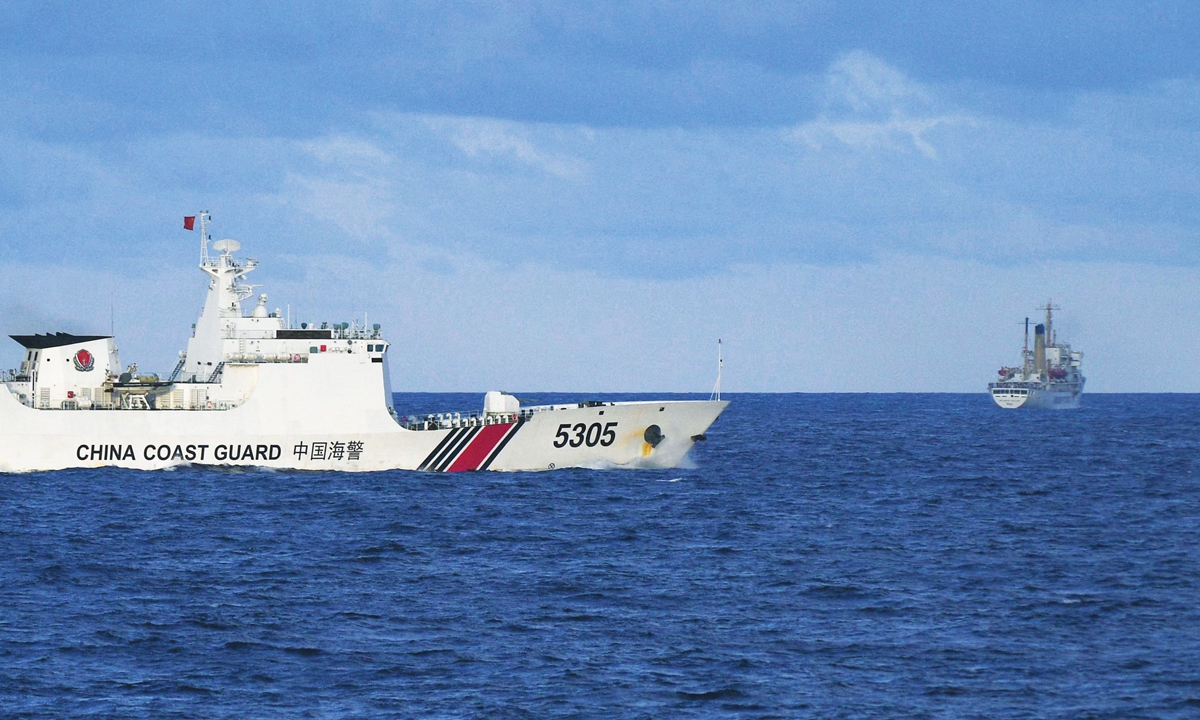Philippines attempts to introduce external forces, escalate dispute by daring China to 're-arbitrate'

A Chinese Coast Guard ship drives away a Philippine vessel that intrudes into adjacent waters of Ren'ai Jiao in the South China Sea on December 10, 2023. Photo: VCG
After its recent repeated attempts to resupply its military vessel near China's Ren'ai Jiao (Reef), the Philippine Defense Minister further provoked China on Monday by daring China to go through another so-called international arbitration.
During the past few months, the Philippines has escalated tensions in the South China Sea, repeatedly ignoring China's objections.
Experts said that the Philippines' "revival" of the illegal arbitration is aimed at bringing in external forces and expanding and internationalizing the South China Sea issue. The Philippines' repeated provocations are not conducive to the resolution of the issue and regional security, but may instead escalate the issue into larger disputes or even conflicts.
On Monday, Philippine Defense Secretary Gilberto Teodoro claimed that "China should prove the strength of its maritime claims through arbitration," Reuters reported.
Teodoro's open provocation came right after Chinese Vice Foreign Minister Chen Xiaodong and the Chinese Embassy in the Philippines on Monday lodged representations with the Philippines side over the recent illegal trespasses by Philippine resupply vessels into waters adjacent to Ren'ai Jiao.
The Philippines' disappointing response once again reflects its intention to continue causing trouble and provoking China in the South China Sea region in the near future, experts told the Global Times.
While the Philippines intends to illegally occupy China's islands and reefs in the South China Sea, China has continuously sought to maintain its territorial sovereignty lawfully, Gu Xiaosong, dean of the ASEAN Research Institute of Hainan Tropical Ocean University, told the Global Times on Tuesday.
"The issue of the Philippines' illegal occupation of China's islands and reefs in the South China Sea is completely outside the scope of international arbitration," Gu said. "The sole purpose of the Philippines' repeated calls for 'arbitration' is to internationalize the South China Sea issue and introduce external forces to interfere in the resolution of the issue."
The so-called award on the South China Sea arbitration in 2016 seriously violates international law including the United Nations Convention on the Law of the Sea (UNCLOS) and is illegal, null and void. China neither accepts nor recognizes it, according to the Chinese Foreign Ministry.
If the Philippines continues to ignore China's restraint and continues to solicit external forces to infringe on China's legitimate sovereignty and interests in the South China Sea, it will inevitably further escalate the situation in the South China Sea, which is not conducive to regional stability and may even lead to conflict. This is entirely the responsibility of the Philippines, Gu warned.
At the same time, observers said that the recent provocations by the Philippines against China in the South China Sea have been supported by many forces, including the US, Japan and India. Officials from the US and India have recently spoken out in support of the Philippines and expressed a desire to strengthen defense cooperation with the Philippines. Additionally, the US, Japan and the Philippines are planning their first trilateral summit, with experts predicting that the theme will be to enhance their defense cooperation to counter China.
In response, Chinese Foreign Ministry spokesperson Lin Jian said during a routine press conference on Tuesday that maritime disputes are issues between the countries concerned. Third parties have no right to interfere whatsoever.
"We urge relevant parties to face squarely the facts and truth on the South China Sea issue, and respect China's territorial sovereignty and maritime rights and interests and the efforts of regional countries to keep the South China Sea peaceful and stable," he noted.
The recent turmoil and instability in the South China Sea are mainly caused by interference from external forces, with the main purpose being to woo the Philippines and promote the US strategy of containing China in the Indo-Pacific region. However, this is not something that most countries in the region, including Southeast Asian countries, would agree with, said Gu.

